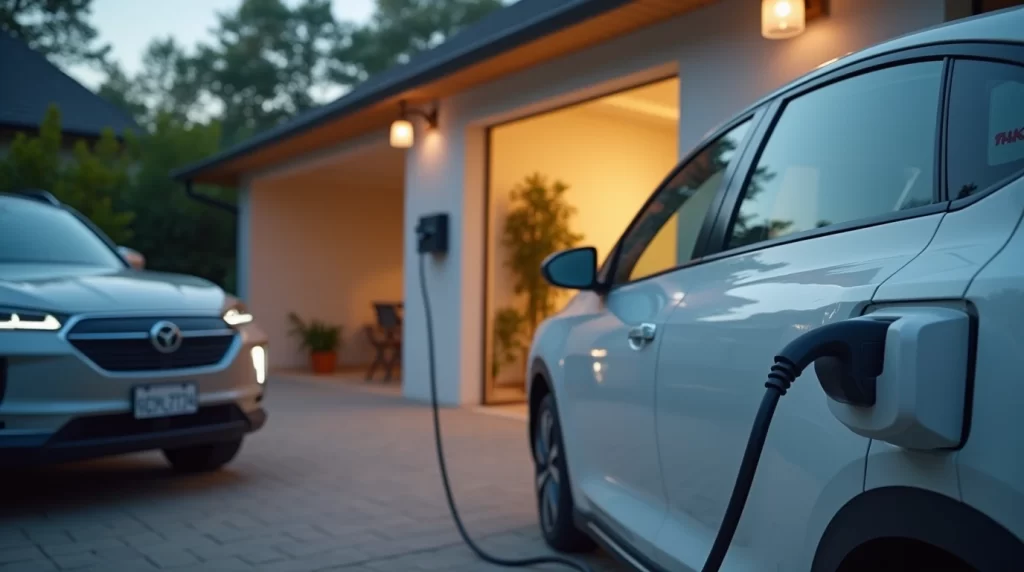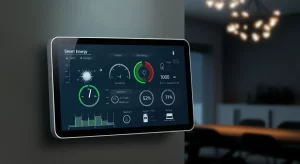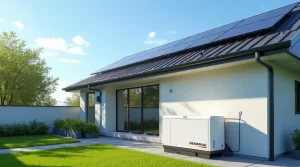As electric vehicles (EVs) become increasingly popular, installing a home charging station is a practical and convenient solution for EV owners. Choosing the right EV charging station can be a daunting task due to the variety of options available. This comprehensive guide will help you understand the key factors to consider when selecting the perfect EV charging station for your home.
Understanding EV Charging Levels
There are three main levels of EV charging stations, each with different charging speeds and electrical requirements.
Level 1 Charging
- Voltage: 120 volts AC
- Charging Speed: Adds about 2-5 miles of range per hour
- Use Case: Ideal for overnight charging with low daily mileage
- Pros: Uses a standard household outlet; no additional equipment needed
- Cons: Very slow charging; may not meet all driving needs
Level 2 Charging
- Voltage: 240 volts AC
- Charging Speed: Adds about 10-60 miles of range per hour
- Use Case: Most common for home charging; suitable for daily use
- Pros: Faster charging times; wide range of features available
- Cons: Requires professional installation and potential electrical upgrades
Level 3 Charging (DC Fast Charging)
- Voltage: 400-900 volts DC
- Charging Speed: Adds up to 100-200 miles of range in 30 minutes
- Use Case: Primarily for commercial use; not typically installed in homes
- Pros: Extremely fast charging
- Cons: Very expensive; not compatible with all vehicles; high power requirements
Assessing Your Vehicle’s Charging Requirements
Different EVs have varying charging capabilities. It’s essential to understand your vehicle’s specifications.
Maximum Charging Rate
- Onboard Charger Limitations: Your EV’s onboard charger determines the maximum rate at which it can accept power.
- Check Manufacturer Specifications: Refer to your vehicle’s manual or manufacturer’s website for details.
Connector Type
- Common Connectors: Most EVs in North America use the SAE J1772 connector for Level 1 and Level 2 charging.
- Tesla Owners: Tesla vehicles come with an adapter to use J1772 chargers, but you may opt for a Tesla-specific charger.
Evaluating Your Home’s Electrical Capacity
Before installing a Level 2 charging station, assess whether your home’s electrical system can handle the additional load.
Electrical Panel Capacity
- Amperage Rating: Determine if your electrical panel has sufficient amperage to support a 240-volt circuit.
- Available Circuit Breaker Slots: Check for open slots in your panel for a new double-pole breaker.
Potential Upgrades
- Panel Upgrade: If your panel is insufficient, you may need an upgrade to a higher amperage panel.
- Load Calculation: A professional electrician can perform a load calculation to ensure safety and compliance.
Selecting the Right Charging Station Features
Modern EV charging stations come with a variety of features that can enhance usability and efficiency.
Charging Speed
- Amperage Options: Level 2 chargers typically range from 16 amps to 80 amps.
- Higher Amperage = Faster Charging: Choose a charger that matches your vehicle’s maximum charging rate.
Smart Connectivity
- Wi-Fi or Bluetooth Enabled: Allows for remote monitoring and control via a smartphone app.
- Features Include:
- Scheduling charging times to take advantage of off-peak electricity rates.
- Monitoring energy usage and costs.
- Receiving updates and notifications.
Cable Length
- Standard Lengths: Cables range from 16 to 25 feet.
- Consider Your Parking Setup: Ensure the cable can comfortably reach your vehicle’s charging port.
Durability and Weather Resistance
- Outdoor Installation: If installing outside, look for chargers with a NEMA 4 rating or higher.
- Temperature Tolerance: Ensure the charger operates effectively in your local climate conditions.
Safety Certifications
- UL Listed or ETL Certified: Indicates the charger meets recognized safety standards.
Installation Considerations
Proper installation is crucial for safety and performance.
Professional Installation
- Licensed Electrician: Always hire a professional to install your charging station.
- Permits and Inspections: Compliance with local codes and regulations may require permits and inspections.
Installation Location
- Indoor vs. Outdoor: Decide whether to install the charger in a garage or an outdoor parking area.
- Accessibility: Choose a convenient location that minimizes the risk of tripping hazards and cable damage.
Cost and Incentives
Understanding the costs involved and available incentives can make your investment more affordable.
Charging Station Cost
- Price Range: Level 2 chargers typically cost between $500 and $1,200.
- Additional Features Increase Cost: Smart connectivity and higher amperage chargers are more expensive.
Installation Costs
- Variables: Costs depend on the complexity of the installation and any necessary electrical upgrades.
- Average Cost: Professional installation can range from $300 to $1,000 or more.
Available Incentives
- Federal Tax Credits: The U.S. federal government offers tax credits for EV charger installation.
- State and Local Rebates: Many states and utilities provide additional incentives.
- Check Eligibility: Visit the U.S. Department of Energy’s Alternative Fuels Data Center for current incentives.
Safety and Compliance
Safety should be a top priority when selecting and installing your EV charging station.
Compliance with Codes
- National Electrical Code (NEC): Installation must comply with NEC guidelines.
- Local Regulations: Adhere to any additional local building codes and ordinances.
Ground Fault Protection
- Built-In Safety Features: Ensure the charger includes ground fault circuit interrupter (GFCI) protection.
Choosing a Reputable Installer
Selecting the right professional ensures a smooth and compliant installation process.
Qualifications to Look For
- Licensed and Insured: Verify the electrician’s credentials.
- Experience with EV Chargers: Prefer installers with specific experience in EV charging stations.
- Positive Reviews and References: Check online reviews and ask for customer references.
What to Expect
- Site Evaluation: The installer should assess your electrical system and recommend appropriate solutions.
- Transparent Pricing: Obtain a detailed quote outlining all costs.
- Permitting Assistance: A reputable installer will handle necessary permits and inspections.
Conclusion
Choosing the right EV charging station for your home involves understanding your vehicle’s requirements, evaluating your home’s electrical capacity, and selecting a charger with the features that best suit your needs. By considering installation factors, costs, safety, and professional assistance, you can ensure a convenient and efficient home charging experience.
Ready to make the switch? Contact Kendrick Electric for expert guidance and professional installation services.
👉 Contact us today to schedule a consultation.



